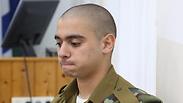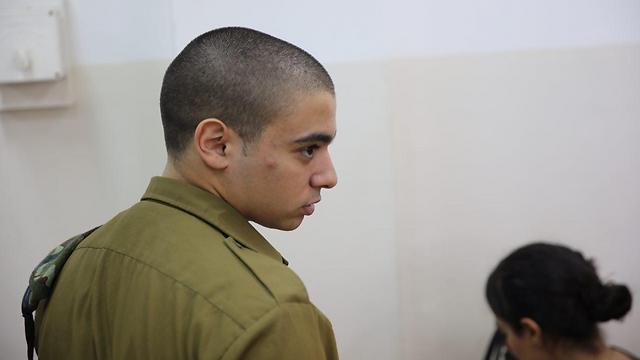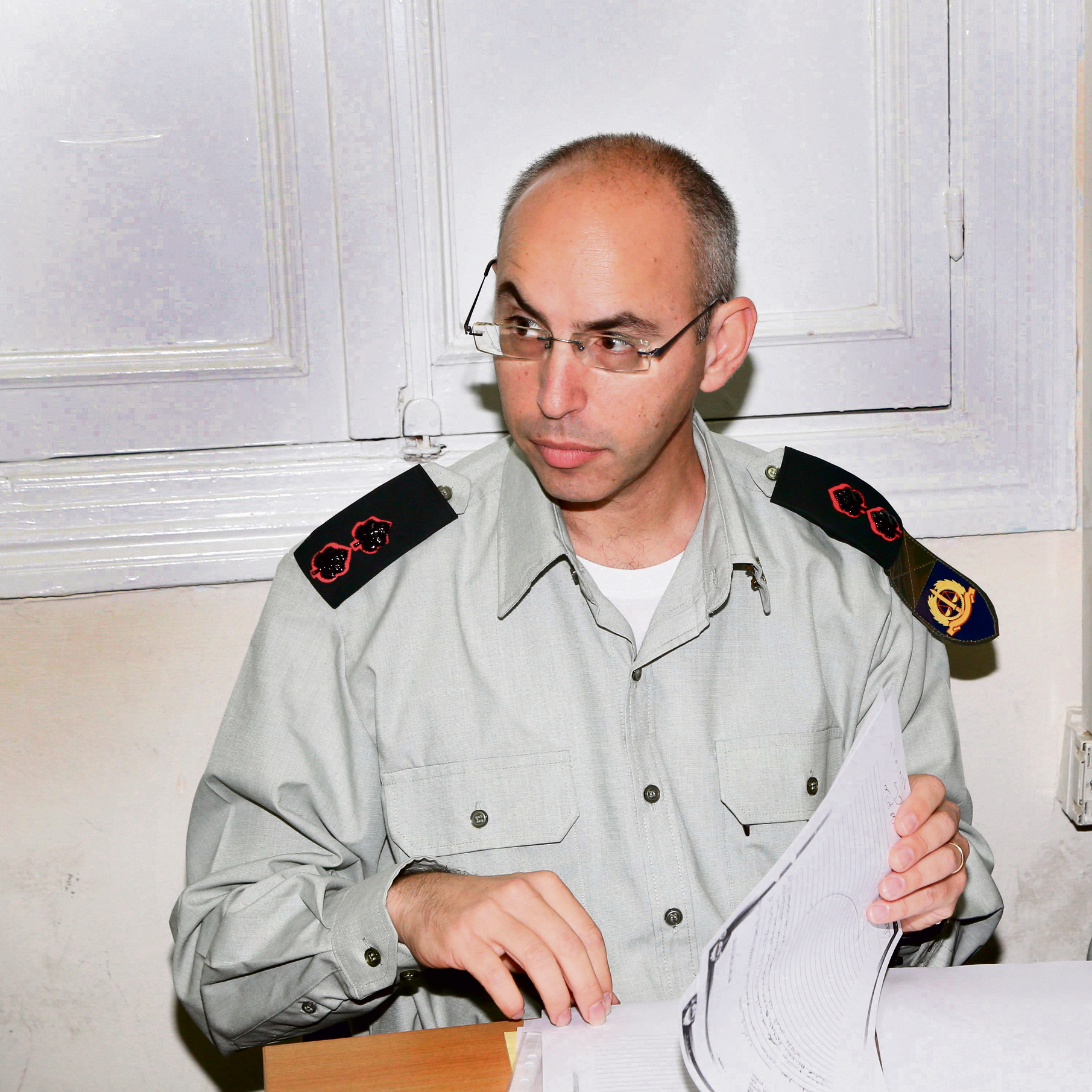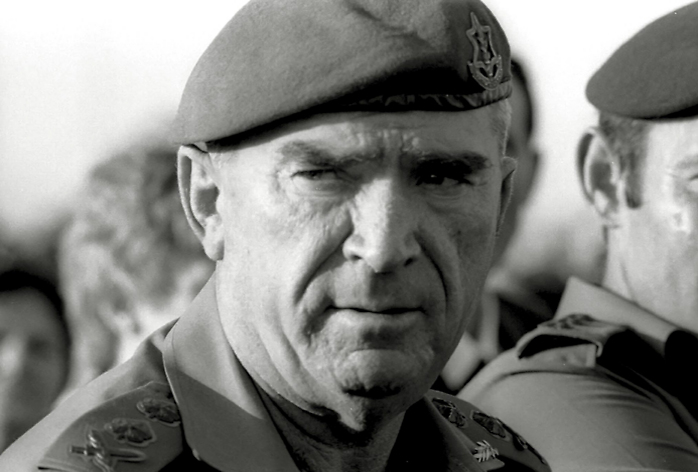
The walking dead of the Azaria trial
Op-ed: Dr. Dov Shimon's claims that the terrorist Sgt. Elor Azaria shot in Hebron was already dead are reminiscent of the claims made by doctors in the Bus 300 affair, who claimed the terrorists seen taken alive out of the bus were actually already dead. One guy can die without knowing it, but two?
Last week, Dr. Dov Shimon, a surgeon, testified in the trial of IDF soldier Elor Azaria. Dr. Shimon was summoned to give testimony on behalf of the defense to substantiate an opinion written by Professor Yehuda Hiss, the ousted head of the Abu Kabir Forensic Institute.
Prof. Hiss's hypothesis was simple: The terrorist, who had been shot by soldiers after attempting to stab them, immediately died of wounds sustained in that first shooting. When Azaria arrived at the scene 11 minutes later and shot the terrorist in the head—he shot a corpse. It's all a big misunderstanding.
"It's likely that the deceased's death was caused by an acute respiratory failure in conjunction with air embolisms to the heart and brain following an injury to the right lung by two bullets," wrote Hiss.
It reminded me of the Bus 300 affair. In April 1984, four Bedouin teenagers—all about 18 years old—hijacked an Egged bus on its way from Tel Aviv to Ashkelon. They demanded the release of hundreds of Fatah prisoners in exchange for the hostages on the bus. Sayeret Matkal commandos stormed the bus and killed two of the hijackers. The other two were captured and taken out of the bus. We, a small group of journalists, saw them at that point—beaten but very much alive. We also took their photos. Shortly thereafter, we were informed that they had died during the raid.
When a photo of the two living hijackers made the papers, and questions started popping up, two well-known doctors—one of whom was a recipient of the Israel Prize—wrote opinions that stated the two terrorists were dead when they were taken off the bus. The blows they suffered caused fatal damage to their internal organs. The Shin Bet agents didn't know this. So no one was to blame, really.
When I received that opinion from one of the suspects' lawyers, I couldn't believe it. One guy can die without knowing it, sure, but two? Two people dying and then keep on singing happens only in the opera.
The truth came out years later: The two were murdered in cold blood by Shin Bet agents. The storm within the Shin Bet and outside of it was so big that the medical opinions were all but forgotten. The doctors were not punished or reprimanded, their reputation was not tarnished, their fame did not die out. The courts continued accepting professional opinions from doctors, economists, engineers, architects, and military officers in reserves. There is probably no better, more credible system. Normally, the judges are too polite to ask the honorable witnesses who exactly paid them and with whose coin.
From day one, the Azaria trial has been fought in two courts: The military one in Jaffa and that of public opinion. The fight in Jaffa is relatively simple: It focuses on evidence. The prosecutor, Lt. Col. Nadav Weisman, currently has the upper hand on that front. The fight for public opinion is far more complicated: In practice, it was already won the very first day. A poll by the Israel Democracy Institute found that 65 percent of Jews in Israel justify Azaria's actions, while 51 percent justify the soldiers who are threatening to stop serving if he is convicted.
Azaria's legal and political defense teams hope the verdict given by the court of public opinion influences the verdict given by the military court. Public opinion is their most effective weapon. For this very reason, the prosecution is worried.
On September 19, two major generals in reserves, Uzi Dayan and Dan Biton, will testify on behalf of the defense. On September 27, Brig. Gen. (res.) Shmuel Zakai will testify. The law requires expert witnesses to submit their professional opinions in writing ahead of their testimony in front of the court. The opinions submitted by Dayan and Biton were different to what they said on the topic to the press. The disparity tells us more about them than about the shooting in Hebron. Uzi Dayan prides himself on knowing how to recite all of Nathan Alterman's poems. He knows the lines, but he failed to internalize the core values the poems are based on.
There have been cases dealing with norms of fighting in the IDF from day one. It's easy to say that when it comes to this loaded issue, Israeli public opinion has changed: It's because of 49 years of occupation; it's because of the continuing right-wing regime; it's because of Netanyahu. It's easy to say that, but those might not exactly be the facts.
I had the honor of covering quite a few cases like this. Some of them I even broke myself. All of them featured massive disparities between IDF orders and the Israeli law on the one hand, and public opinion on the other.
When Rafael "Raful" Eitan was the IDF chief of staff, he exploited the power he was given to distort justice and send a message. In Raful's eyes, anyone who killed an Arab was innocent—even if the Arab was an innocent bystander or a captive bound hand and foot. An innocent civilian was murdered by an off-duty civil defense soldier on a main street in Jerusalem; bound captives were murdered in Lebanon. Raful mitigated the punishment of these murderers willy-nilly, setting them free. What's interesting is that he had the complete opposite views on looting. Looters were punished to the full extent of the law. The message was clear: Murder was okay, theft was not. Property was more precious than life.
The military judicial system refused to accept Raful's policies. The law was changed, and the IDF chief's pardon power was reduced. Later rulings by the High Court of Justice revoked the option from the IDF to settle for disciplinary action in such cases. The investigation is criminal in nature; the sentencing is handed out by the court.
Raful was a bold fighter and a failing IDF chief who left the IDF stranded in Lebanon for an entire generation. When it came to fighting norms, he adopted the ones he grew up on—what he learned from his father's actions and what he learned in the paratroopers in the 1950s. The pardons he handed out didn't hurt his position. On the contrary, the Israeli public loved him. He built an entire political career on that love.
Public opinion hasn't changed, the IDF's senior command did. The change is entirely for the better: The IDF today has more respect to the law, to instructions, to procedures, and more service awareness. In the past, there were those in the IDF who preferred soldiers and commanders operated within a cloud of ambiguity. Today, the high echelons of the IDF realize that clarity is vital for the military's operations. It's vital because of the dilemmas created by the occupation. In a state of ambiguity, the IDF will suffer.
The change for the worse is in the involvement of the public in the process. The Azaria trial is the first in which the influence of social media on the IDF's law enforcement was clearly felt. While in the past, officers and soldiers put on trial would ask their friends for money so they could afford good lawyers. Azaria doesn't need friends. His lawyers complained early in the trial that they were not compensated for their services, and then, in one fell swoop, social media helped raise over NIS 600,000 to foot their bill.













